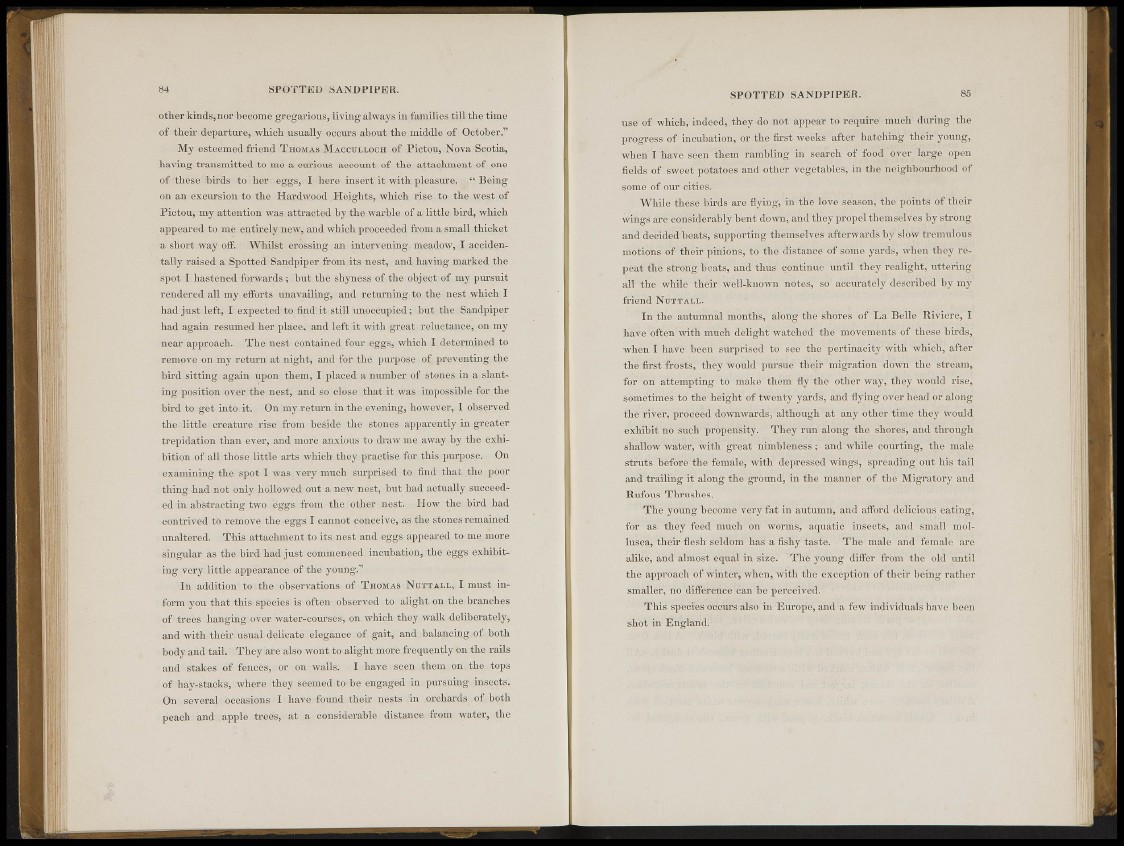
84 S P O TTED SANDPIPER.
other kinds, nor become gregarious, living always in families, tijl the time
of their departure, which usually Occurs about itlie middle ôfi October."
My esteemed friend Thomas .Macci;j.i.o(:ii ot' I'ictou, Nova Scotia,
having.transmitted to M a curious account:of the attachment of one
of these- birds to, hor eggs,. I hero insert it \V;itl> pleasure. " lieing
on an excursion to the Hardwood Heights, which rise to thc„»:est of
Pictou, iu-y attention was attracted "by the warble of a little bird, which
appeared to me entirely new, and which proceeded from a small thicket
a short, way oit'. ' Whilst crossing an intervening, meadow, I accidentally
raised a Spotted Sandpiper from.its nest, and.having marked the'
spot I'hastened: forwards ; hut the shyness of the object of my pursuit
rendered all my efforts unavailing, and returning, to the nist which I
had just loft, I expected to find it still unoccupied : .but the:¡Sandpiper
had again resumed lier place, and left-it. with great reluctance, on my
near approach. The nest contained lour eggs, which 1 determined to
remove on my return at nighty and for the purpose of preventing thé:
bird sitting again..ùpi)ngjtlit'm, I placed a number of stones in a slanting
position over the nest, and soi close that it was impossible for the
liird to get into it. On my. return in the evening-, however, I observed
the little- creature rise; from- beside the stones apparently in greater
trepidation than ever, and more anxious to .draw me away by.:the exhibition
of all those little arts which they practise for this purpose. On
examining the spot 1 was very much surprised to find tha^jhe poor
thing had not only hollowed out a new nest, but had actually succeed-
. ediii, abstracting two eggs from the other nest. How the bird had
contrived to remove the eggs I cannot conceive, as the stones remained
unaltered. This attachment to its iiesl and1 .eggs appeared to îmymore
singular as the bird had just commenced incubation, the eggs exhibiting
very little appearance of the young."
In addition' fot.the -observations, of Thomas J îdt tal l , I must inform
you that this species is often- obs^tÀt® alight on the branches
of trees hanging over water-courses, 011 which they walk deliberately,
and with their usual delicate elegance of gait, and balancing of both
body and tail. " They are also wont,to alight moiè frequently en the rails
and ¿takes of fences, or on walls. I havovscen them on the tops
of hay-stacks, where they seemed to be engaged in pursuing insects.
On. several occasions I have -found their nests in .orchards of both
peach and apple tree's, at a considerable distance i'rmn water, the
SPOTTED SANDPIPER. 85
use o® which, indeed, they do not appeair to require much during the
progress- of incubatioBj or the first weeks after hatching their young,
when I have séen them rambling in search of food over large open
fields of sweet potatoes and other vegetables, in the neighbourhood of
some of our cities.
While these birds are flying, in the love seiuson, the points of their
Wings are considerably bent p m , and they propel themselves by strong
and decided beats, supporting themselSfes afterwards by slow tremulous
motions of their pinions, to the distance of some yards, when they repeat
the strong beats, and'thus continue until they rèàlight, uttering
all the while their well-known notes, so accurately described by my'
friend Nuttai'.i..
In the autumnal months,' along the shores of La Belle Riviere, I
have often with much deligral watèìsédi the movements of these birds,
when I have been surprised to see the pertinacity with "which, after
the first frosts, ' they would pursue'' their migration down the stream,
for on attempting to make; 1 lioni1 fly the other way^ they would rise,
sometimes-to the height of twenty yards, and flying over head or along
the river, proceed downwards, although at any other time they would
exhibit no such-'pr'ópefflfty. They run along the shores, and through
shàJlòw water, with great nimbleues-s ; and while courting, the male
struts before the female, with depressed wings, spreading out his tail
and trailing it along the ground, in the manner of the Migratory and
Rufous Thrushes.
The young become very fat in autumn, and afford delicious eating,
for as they feed much oil worms, aquatic insects, and small mollusca,
their flesh seldom has a- fishy taste. The male and female are
¿Duke, and almost'equal in size? Thè young differ from the old until
the approach of winter, when, with, thè exception of their being rather
smaller, no difference can be perceived.
This species o'ceurs also in Europe, and a few individuals have been
shot in England?